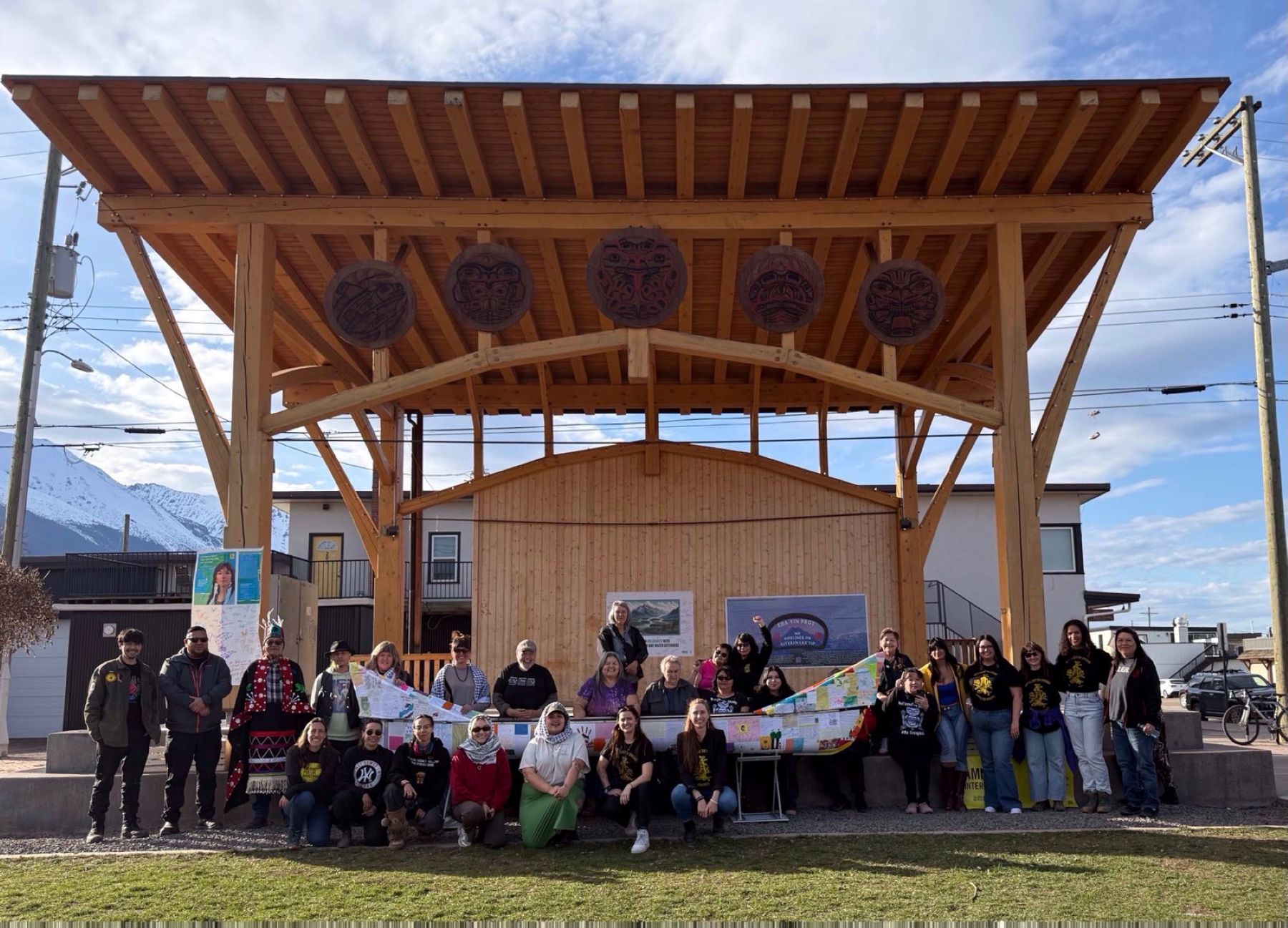Earlier this spring, Amnesty International had the honour of delivering more than 26,000 letters of solidarity to Wet’suwet’en land defenders as part of our Write for Rights global campaign. These letters, written by supporters around the world, were a resounding call to respect Indigenous rights, uphold Wet’suwet’en law, and stop the criminalization of land defenders. For the first time in the campaign’s history, a collective of Indigenous land defenders in Canada was chosen as a global case, signaling the urgency of the struggle on Wet’suwet’en Yintah.
One of the most powerful expressions of solidarity came through the creation of a solidarity canoe, constructed using the very letters written by supporters around the world. Over 26,000 messages of support were transformed into a paper war canoe, a meaningful offering to the Wet’suwet’en Hereditary Chiefs and community members. Built with care and purpose, the canoe carried the spirit of international unity, representing a collective commitment to uphold Indigenous rights and Wet’suwet’en law.
The delivery of the canoe was accompanied by a moving community gathering that included drumming, singing, and dancing, celebrating the strength of Wet’suwet’en culture and resistance. The event saw a high turnout from community members and allies, coming together in a collective expression of strength, pride, and support. It was also a moment of powerful testimony, as we heard directly from Wet’suwet’en land defenders, including Sleydo’ and Chief Na’Moks, who shared reflections on the struggle, the resilience of the Wet’suwet’en people, and the critical importance of continued international support. Their words reminded us that these letters are not simply symbols, they are tools of resistance, recognition, and respect.
Follow-Up Research on the Proposed Compressor Stations
The visit to Wet’suwet’en territory was rooted not only in solidarity, but also in accountability and continued research. During the first few days on the territory, we conducted follow-up human rights research related to the proposed compressor stations linked to the Coastal GasLink pipeline. These developments raise serious concerns, not only about environmental and climate impacts, but also about Free, Prior and Informed Consent (FPIC), surveillance, and the increasing criminalization of Wet’suwet’en land defenders.
What makes this research unique is that the compressor stations have not yet been built. This represents a new and significant shift for Amnesty International engaging in advocacy based on potential human rights impacts before infrastructure is developed, rather than limiting our response to harm that has already occurred. This proactive approach strengthens our ability to support Indigenous communities in asserting their rights before irreversible harm occurs.
These industrial sites pose a direct threat to Wet’suwet’en law, governance, access to their territory and way of life. Our team gathered testimony, observed the impacted areas, and assessed the ongoing impacts of state and corporate encroachment on unceded lands.
Grounding in the Yintah: Connection, Presence, and Learning
During our visit, we spent meaningful time on the Yintah, Wet’suwet’en territory, walking the land, listening, and learning. This was not just a research mission, but also a chance to be present in a place that holds deep cultural, legal, and spiritual significance. Being on the Yintah helped ground our work in the lived realities of Wet’suwet’en land defenders and gave context to the challenges and responsibilities they carry.
One part of our journey included a visit to the Unist’ot’en Healing Centre, a place deeply rooted in land-based healing and Wet’suwet’en law. Bring at the healing centre provided a powerful reminder of the strength and sacredness of the territory, and the generations of care that have gone into protecting it. The land speaks and the river, the forests, and the people are all part of that voice.
We were guided not only by the stories of resistance, but also by moments of quiet connection to the land, moments that reminded us why this struggle is so urgent and so deeply personal for many.
Relationship-Building with Gitanyow
Our journey also led us to Gitanyow territory, where we began building new relationships with community members, leaders, and land stewards. These conversations affirmed the shared experiences and concerns among Nations whose lands, laws, and watersheds are threatened by extractive development.
As our relationships grow, so too does our responsibility to uphold Indigenous laws, support sovereignty, and amplify these struggles on a national and international level.
Standing with Wet’suwet’en Ahead of Sentencing
The trip was also timely. As we prepare for the sentencing hearings of Wet’suwet’en land defenders on October 15–17, 2025, our commitment to monitoring and advocacy remains firm. These charges are part of a broader pattern of criminalizing Indigenous resistance, punishing those who uphold traditional governance and protect their lands from exploitation.
Ways to Take Action to Support Wet’suwet’en Land Defenders
The Wet’suwet’en Nation continues to assert their sovereignty and protect their unceded Yintah against ongoing state and corporate encroachment. With the upcoming sentencing hearings, now is the time to mobilize support.
1. Call for an End to Criminalization
Demand that the Crown withdraw charges against land defenders and end the militarized enforcement of private industry interests on Indigenous land.
2. Amplify Their Voices
Follow, share, and repost updates from trusted Wet’suwet’en-led platforms:
· @Gidimten
· unistoten.camp
· yintahaccess.com
3. Educate Yourself and Others
Learn about Wet’suwet’en legal orders (Anuk Nu’at’en), FPIC, and the impacts of colonial resource extraction. Start with:
· Yintah (Documentary)
· Wet’suwet’en community websites and spokespeople
Header image: Wet’suwet’en Land Defenders and Amnesty International standing with solidarity letters canoe during Write for Rights Letter Delivery Event, Smithers BC. © Alli McCracken/Amnesty International.






















